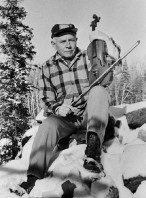At the middle of the twentieth century, Ernest Oberholtzer '07, G '08 (1884-1977), longtime president of the Quetico-Superior Council, was "one of the best known and most honored environmentalists in North America," according to Joe Paddock, author of Keeper of the Wild: The Life of Ernest Oberholtzer (Minnesota Historical Society Press, $27.95). Because "Ober" wrote no books, he is little remembered, although he led the fight to save the area that became Voyageurs National Park and the Boundary Waters Canoe Area Wilderness. Close friends from Harvard days were writer Conrad Aiken '11 and historian Samuel Eliot Morison '08, Ph.D. '12, Litt.D. '36, whose retarded brother he had tutored. Ober lived for years on a tiny, rocky island with no modern facilities in Rainy Lake, near the Canadian border in Minnesota.
At five-year intervals, Ober's Harvard class of 1907 privately published reports on its members. Most people have individuals or groups, often parents, to whom they look for affirmation about the course of their lives. For Ober, lacking family other than his mother, his Harvard classmates were one such group, and his reports to them were rich and lively, among the best in the collection....
[U]ntil the end of his days Ober felt keenly the fact that fewer than a third of the original ten million acres he had envisioned were to be protected under anything like the program he had developed. The Boundary Waters Canoe Area Wilderness has become the largest wilderness area east of the Rockies and is now the most visited wilderness area of all, but, with luck in dealing with the governments of Minnesota and Ontario, much more of the region might have been protected, and Ober was to forever feel pain for what might have been.
 |
| Ober often took his second-best violin on wilderness trips. While at Harvard, he studied under the concertmaster of the Boston Symphony Orchestra. |
| Ernest C. Oberholtzer Foundation |
"Close friends of all sorts have occupied a large part of my life and still do. Whatever the other interestsand there have been manythese friends know my incurable slant toward primitive people and wilderness, particularly Indians and Eskimos and the sub-arctics of America. The Indians, who love droll caricatures, could probably give a more 'vivid picture' of me at this late date than I....
"There have been times in my life at Rainy Lake when I have been entirely alone for long periods. In summer the situation is often just the opposite. Whatever has happened, even in the worst times, I have thought I was enjoying myself. Many of my intelligent friends are unhappy. I have a suspicion that only the ignorant are happy but am willing to accept the onus. In worldly wealth I have much less than at the start, but I am richer in health and friends of every sort, many of the best of them Indians who never had a day in school. I have never had a car or driven one but have lived on a big wide-open stage and seen a whole pioneer era passprobably the last. I have my heart set now on that fiftieth anniversary in Cambridge, even if I have to slip in by way of the Charles in a battered birch-bark canoe."





